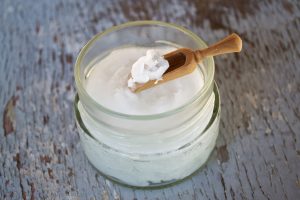Also called clarified butter, ghee is prepared by heating butter and removing the milk solid portions from the fat which is known as ghee. Ghee is better tolerated than butter because of its scant quantities of casein and lactose, and it can usually be safely used by those who have sensitivities to butter or other dairy products. In the case of fat content, it has about 50% saturated fats.
One tablespoon of ghee has approximately:
– 112 calories
– overall fat content of 12.7 grams (7.9 grams saturated and 4.2 grams unsaturated)
– 32.6 mg of cholesterol
Coconut oil, however, has about 90% saturated fats.
The most common kind of coconut oil available on the market is virgin coconut oil made from expeller-pressing the oil from dried coconut. One tablespoon of coconut oil has:
– 116 calories
– 13.5 grams of fat (11.7 grams saturated fat and 1 gram unsaturated).
– Coconut oil does not have cholesterol
But has instead phytosterols, also called plant sterols, which are a family of molecules correlated to cholesterol. Coconut oil has virtually no carbs, no fibers, or no proteins. And except small amounts of vitamin K, coconut oil contains no vitamins or minerals.
Is ghee better than oil?
Ghee is great for people who have issues with digestion, this is because the ghee has many gut-friendly enzymes. Since Ghee doesn’t consist of casein, it is good for dairy-intolerant people.
Ghee includes conjugated linoleic acid which is a kind of omega-6 fatty acids that are healthy as well and can make you lose weight and burn fat.
Ghee has a rich variety of fats and high levels of monounsaturated fatty acids which help in decreasing the levels of bad cholesterol and raises the levels of good cholesterol. It also heals the digestive tract and keeps it healthy. Seeing this, we can’t say which one is better since both have advantages and disadvantages.

Coconut Oil Better For Your Health Than Ghee
Can you substitute coconut oil for ghee?
Coconut oil does not only have health advantages but it also has skin and hair benefits. Coconut oil is anti-inflammatory and anti-fungal, it also contains medium-chain triglycerides which is why the digestive system does not take much time for its breakdown.
Coconut oil can increase the metabolism of the body. So, it is highly beneficial for people who want to lose weight. It also can decrease thyroid hormones. The best thing about coconut oil is that people do not have allergies because of it. It also improves the health of the hair and even improves energy.
Does Ghee reduce inflammation?
It includes large quantities of butyrate, a fatty acid that has been associated with an immune system response that helps reduce inflammation in the body of people. Ghee makes a more alkaline system that is capable of decreasing inflammation by reducing the leukotriene secretion and reducing prostaglandin in the body.
Does Ghee increase cholesterol?
A detailed analysis has depicted that ghee includes oxidized cholesterol but fresh butter does not. While ghee may be good for the body in moderate quantities, too much of it can increase your cholesterol levels as it has saturated fats.
Since Ghee is pure fat, it can be difficult to digest by the people who have a weak digestive system. Another drawback of ghee is that ghee is sometimes mixed with raw butter and pure ghee may not be available. The ghee mixed with raw better may be harmful.
What is coconut oil good for?
Coconut oil is rich in healthy saturated fats that contain different impacts than most other fats in your diet. These fats can increase fat burning and provide your body and brain with rapid energy. They also increase the good HDL cholesterol in your blood, which is linked to decrease heart disease risk.
Does coconut oil have side effects?
Underweight people might have a problem with the consumption of coconut oil, this is because the coconut increases the metabolism of the body which is why people may lose weight with it. Also, another thing that may not be appreciated by many is that it is not rich in Vitamin A, D and K. Also, the coconut oil has a greater heat tolerance as compared to ghee or olive oil.




